Films from the country "italie", sorted by rating
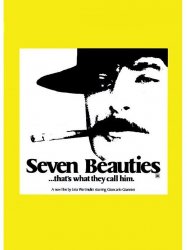
Seven Beauties (1975)
, 1h55Directed by Lina Wertmüller
Origin Italie
Genres Drama, War, Comedy, Comedy-drama
Themes Medical-themed films, Films about religion, Films about psychiatry, Political films, Films about Jews and Judaism, Films set in psychiatric hospitals
Actors Giancarlo Giannini, Fernando Rey, Shirley Stoler, Roberto Herlitzka, Aldo Valletti, Massimo Vanni
The picaresque story follows its protagonist, Pasqualino (Giannini) who, as a dandy and small-time hood in Naples, to save the family honour, is sent to prison for killing a pimp (and then dissecting the victim and placing the body in suitcases) who had turned Pasqualino's sister into a prostitute. Convicted and sent to prison, Pasqualino succeeds in being transferred to a psychiatric ward. Desperate to get out, he volunteers for the Italian Army, but then somewhere in Germany he deserts with a comrade. They are captured and sent to a concentration camp. There, in a bid to save his own life, Pasqualino decides to survive by providing sexual favors to the obese and ugly female commandant (Stoler). His plan succeeds, except for the fact that he is then put in charge of the barracks as a kapo, and is obliged to select six men to be killed under the threat that if he doesn't do so, they will all be killed. Pasqualino ends up executing the soldier with whom he was captured and being responsible for the death of another fellow prisoner, a Spanish anarchist. At the war's end, upon his return to Naples, Pasqualino discovers that his seven sisters, his fiancée and even his mother have all survived through prostitution.
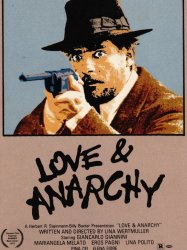
Love and Anarchy (1973)
, 2hDirected by Lina Wertmüller
Origin Italie
Genres Drama, Comedy, Comedy-drama, Romance
Themes Films about anarchism, Politique, Political films
Actors Giancarlo Giannini, Mariangela Melato, Eros Pagni, Lina Polito, Pina Cei, Isa Bellini
The film begins with Tunin (Giancarlo Giannini) learning that his friend, an anarchist who was plotting to kill Benito Mussolini, has been killed by Mussolini's fascist police in the countryside. Tunin decides to take up the cause his friend died for. The movie then shows Tunin entering a brothel in Rome and meeting Salomè (Mariangela Melato). The two have a casual sexual encounter. Salomè explains her reasons for helping in the assassination plot as her former lover was wrongfully beaten to death by Mussolini's police in Milan. The story continues as Salomè arranges for her, Tunin and Tripolina (Lina Polito), another prostitute at the brothel, to spend the day with Spatoletti, the head of Mussolini's police. The four of them go to the countryside near Rome where the assassination will take place in several days time. Salomè keeps Spatoletti busy while Tunin scouts out the area and makes a plan. Tunin takes an interest, however, in Tripolina and they fall in love. Tunin convinces Tripolina to spend the next two days with him before the assassination as he fears they may be his last. On the morning of the assassination, Tripolina is supposed to wake Tunin early. She loves him and is scared he will die so she decides she will not wake him. Tripolina and Salomè argue about this and what to do but in the end they decide to let him sleep. Tunin wakes up and is furious at both of them. He goes into a tirade that draws the attention of the police. He starts a shootout with them and screams that he wants to kill Mussolini. He is captured and beaten to death by the police. The film ends the way it began showing the full title of the film "Stamattina alle 10, in via dei Fiori, nella nota casa di tolleranza..." This morning at 10, on Via dei Fiori (Flowers Street), in a noted brothel which is the headline of an unnamed newspaper. The article, displaying fascist censorship, goes on to say that Tunin (who is unnamed) was arrested and then committed suicide.
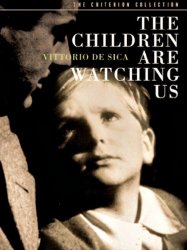
The Children Are Watching Us (1944)
, 1h24Directed by Vittorio De Sica, Vittorio Cottafavi
Origin Italie
Genres Drama
Themes Films about children, Films about families, Films about suicide
Actors Emilio Cigoli, Isa Pola, Adriano Rimoldi, Tecla Scarano, Ernesto Calindri, Olinto Cristina
As the movie begins the viewer is introduced to Pricò, a young Italian boy who lives with his parents in a middle-class household. His mother, Nina, takes him to a local park where he enjoys his time out while watching a puppet show, but is also concerned with a handsome lover named Roberto (with whom Nina has shared a past romance) courting his mother while he is assumed to not be paying attention. As the boy returns home, the family has dinner while Pricò reflects on his day in the park. Later that night, after his mother puts him to bed, she runs off with the stranger, leaving Pricò's father distressed at the idea of having to raise his son himself. While their neighbors share a number of rumors concerning the disappearance of Nina, it is quickly agreed that she ran off with another man. While concerned with her disappearance, Nina quickly returns to the home after a few days for the sake of their son. While the father, Andrea, is not entirely pleased with this arrangement, he relents so that his son may grow up in the same house as his mother.
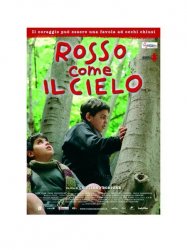
Red Like the Sky (2006)
, 1h30Origin Italie
Genres Drama
Themes Films about children, Medical-themed films, Films about disabilities, La cécité
Actors Paolo Sassanelli
Le film s'inspire de la vie de Mirco Mencacci, un ingénieur du son italien aveugle qui réussit à surmonter son handicap et à réaliser ses rêves. L’histoire se passe en 1971 en Italie à Pontedena, une ville en Toscane. A 10 ans, Mirco Balleri remarque un fusil situé au-dessus de la cheminée. Pour s'en saisir, il monte sur un tabouret qu’il a posé sur une chaise : il perd l’équilibre, tombe par terre et lâche l’arme qui se déclenche et le blesse. A partir de ce jour, Mirco ne voit plus que des taches de lumière, en d’autres termes il est devenu malvoyant. Dans les années 70, les non-voyants ne pouvaient pas accéder à l’école ordinaire. C’est pourquoi, cet accident bouleverse la vie de Mirco car il ne peut aller à l’école avec ses camarades. Il est placé en institut spécialisé catholique dirigé par le directeur Cassoni, lui aussi non-voyant. Les personnes qui s’occupent de l’internat et de l’infirmerie sont des sœurs quant au professeur présent, il s’agit d’un prêtre. Dans cet institut à Gênes, les enfants apprennent les métiers de standardistes et de tisseurs de chaises. Lors de son arrivée, le petit garçon a décidé de ne pas apprendre le braille. Après s’être bagarré avec Valerio, forte tête de l’école. Puni dans la salle des professeurs, il découvre la présence d’un magnétophone qu’il utilise pour réaliser son devoir de sciences. Lors de la remise du travail, l’abbé Giulio le félicite, mais le directeur ne le soutient pas car il a utilisé le magnétophone sans permission. Un soir, Mirco se rend compte qu’il est devenu complètement aveugle.

General Della Rovere (1959)
, 2h12Directed by Roberto Rossellini
Origin Italie
Genres Drama, War
Themes Political films
Actors Vittorio De Sica, Hannes Messemer, Vittorio Caprioli, Giovanna Ralli, Sandra Milo, Anne Vernon
The film tells the story of a petty thief (played by Vittorio De Sica) who is hired by the Nazis to impersonate an Italian resistance leader, General della Rovere, and infiltrate a group of resistance prisoners in a Milan prison.
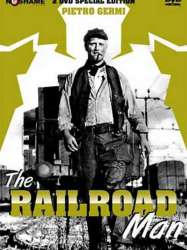
The Railroad Man (1956)
, 1h58Directed by Pietro Germi
Origin Italie
Genres Drama, Romance
Themes Transport films, Rail transport films
Actors Saro Urzì, Pietro Germi, Sylva Koscina, Luisa Della Noce, Carlo Giuffrè, Riccardo Garrone
Train operator Andrea Marcocci has to witness the suicide of a desperate man who jumps in front of his train. Under the influence of this shock he starts making mistakes. A check up by a doctor reveals that he's at the brink of becoming an alcoholic. Due to this evaluation he is degraded and must accept a salary cut.

Everybody's Fine (1990)
, 1h58Directed by Giuseppe Tornatore
Origin Italie
Genres Drama
Themes Films about families
Actors Marcello Mastroianni, Michèle Morgan, Valeria Cavalli, Roberto Nobile, Salvatore Cascio, Jacques Perrin
Matteo Scuro, a retired Sicilian bureaucrat and opera buff, has been stood up by his five adult children during the summer vacation, all of whom live in various cities on the Italian mainland with what he believes are responsible jobs. Despite their not visiting and the neighbours' criticisms, he remains optimistic, considering that his children could not come because they are too busy. His children are named after popular opera characters, Tosca for Puccini's Tosca, Canio for Leoncavallo's Pagliacci, Norma for Bellini's Norma, Guglielmo for Rossini's Guglielmo Tell and Alvaro for Verdi's La forza del destino.
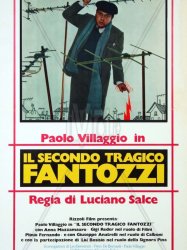
The Second Tragic Fantozzi (1976)
, 1h45Origin Italie
Genres Comedy
Actors Paolo Villaggio, Gigi Reder, Liù Bosisio, Anna Mazzamauro, Antonino Faà di Bruno, Ugo Bologna
The accountant Ugo Fantozzi in this story suffer abuses, deceptions and lies in tragic situations even worse than the first film. Initially he must accompany his Duke Count to a game of chance in Monte Carlo. His boss is very superstitious so that forces Fantozzi to shove his hand under his backside and drink a ton of mineral water so that he can continue to win. Unfortunately for Fantozzi, the Duke Count will lose all his money and blame Fantozzi for the bad luck, forcing him to go back home clinging under the train, as he had no money to pay for the ticket of the compartment. After getting back home, Fantozzi cannot move at all, but is "cured" by Mrs. Pina with scalding-hot cloths on his stomach. In the net episode, Fantozzi goes with fellow accountant Filini for a hunting party. However, the space reserved for hunters is very small and the men, having lost patience and not finding any game, start a real manhunt killing and capturing their peers mistaking them for game and wild animals, quickly escalating to heavy machine guns and tanks. Fantozzi and Filini are not killed but captured by others and exposed.

Christ Stopped at Eboli (1979)
, 2h30Directed by Francesco Rosi
Origin Italie
Genres Drama, War, Historical, Politic
Themes Politique, Political films
Actors Gian Maria Volonté, Lea Massari, Paolo Bonacelli, Alain Cuny, Irène Papas, Antonio Allocca
Carlo Levi was a painter and writer, but he also had a degree in medicine. Arrested in 1935 by Mussolini's regime for his anti-Fascist activities, he was sent to live in a remote town in southern Italy, in the region of Lucania which is known today as Basilicata. The landscape was beautiful, the peasantry poor and neglected. Since the local doctors were not interested in peasants and not trusted by them, he began to help them.

Misunderstood (1967)
, 1h45Directed by Luigi Comencini
Origin Italie
Genres Drama
Themes Films about children
Actors Anthony Quayle, Stefano Colagrande, John Sharp, Giorgia Moll, Graziella Granata
Duncombe is the UK Consul General in Florence, Italy. He becomes a widower when his two sons, Andrew and Miles, are still young kids. Andrew, the eldest, apparently reacts with adult maturity to the loss of his mother, looking after little Miles, an attempt to find a way out of such premature heart-crushing loss. Miles constantly blames Andrew for his mischievous behavior but his brother valiantly takes said blame as his personality is that of a grown up, or at least that is what he tries to be. The father, given his mandate, is often absent, both physically and emotionally, especially toward Andrew. It will be at the end that Duncombe will acknowledge his mistakes when finding himself at a father's point of no return.

Everybody Go Home! (1960)
, 2hDirected by Luigi Comencini
Origin Italie
Genres Drama, War, Comedy
Themes Political films
Actors Alberto Sordi, Eduardo De Filippo, Serge Reggiani, Martin Balsam, Nino Castelnuovo, Claudio Gora
Along the Venetian seaside, on the morning of September 8, 1943, Alberto Innocenzi, junior NCO of the Royal Italian Army is shocked when (in response to the separate surrender signed by the Badoglio government in Cassibile) the former allies of the Wehrmacht surround and take by storm the base where he's stationed. Innocenzi, along with some disbanded soldiers, manages to distance the German troops and is thoroughly shocked when, contrary to his plan of finding a higher echelon to which to report, most of the men accept the fact that the war is over for them and "everybody should just go home".
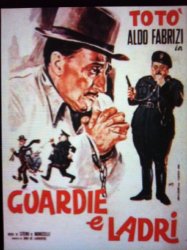
Cops and Robbers (1951)
, 1h49Directed by Mario Monicelli, Steno
Origin Italie
Genres Drama, Comedy
Actors Totò, Aldo Fabrizi, Ernesto Almirante, Ave Ninchi, Pietro Carloni, Pina Piovani
The film is set in Rome during the Marshall Plan. Ferdinando Esposito (Totò) is a small villain who tries to support his family with his tricks. With his accomplice Amilcare (Aldo Giuffrè) pretends to have found an ancient coin in the Roman Forum and an American tourist cheats: Mr. Locuzzo that, unfortunately for him, is the chairman of a committee of the American charity. During the distribution of some gift-packs, also Esposito, these recognize and denounce the spot.

Bandits of Orgosolo (1961)
, 1h38Directed by Vittorio De Seta
Origin Italie
Genres Drama
Themes Seafaring films, Transport films
Michele, a shepherd of Orgosolo unfairly charged with rustling and murder, is forced to take to the hills. In his flight into the inaccessible areas of Barbagia, where there is neither water nor pastures, he loses every sheep in his flock.
 , 1h21
, 1h21Directed by Bruno Bozzetto
Origin Italie
Genres Comedy, Fantasy, Animation
Actors Carlo Romano, Carlo Bonomi, Giuseppe Rinaldi

Poverty and Nobility (1954)
, 1h35Directed by Mario Mattoli
Origin Italie
Genres Comedy
Themes Théâtre, Films based on plays
Actors Totò, Dolores Palumbo, Enzo Turco, Sophia Loren, Carlo Croccolo, Giuseppe Porelli
The story is taken from the Eduardo Scarpetta's play: Naples, 1800. The poor Felice Sciosciamocca tries to work being a scribe for ignorant people, while his friend Don Pasquale tries to make photographs for rich couples. Meanwhile in the house where the two live, their wives start to fight because the apartment is mortgaged, and the women don't have money to pay the rent. Luckily rich Count Luigino, in love with the beautiful dancer Gemma, asks Pasquale and Felice to stage a farce for him. In fact the parents of Gemma want to meet Luigino's family, but he knows that his real father does not approve his love affair with the dancer. So Luigino transforms Don Felice Sciosciamocca into his uncle: Prince of Casadores, and Don Pasquale has to play the true father of Luigino. The young count entrusts a false part to play to all members of the two families, except the second wife of Felice: Concetta. Unfortunately Count Luigino cannot find a role for her, and Concetta gets very angry. While Felice Sciosciammocca and Pasquale're argue in the beautiful villa of Don Gaetano, Gemma's father, Concetta bursts in the home, and tries to compromise the plan organized by Luigino. Fortunately Don Felice manages to fix the situation and in the end, all is happily resolved.
 Connection
Connection